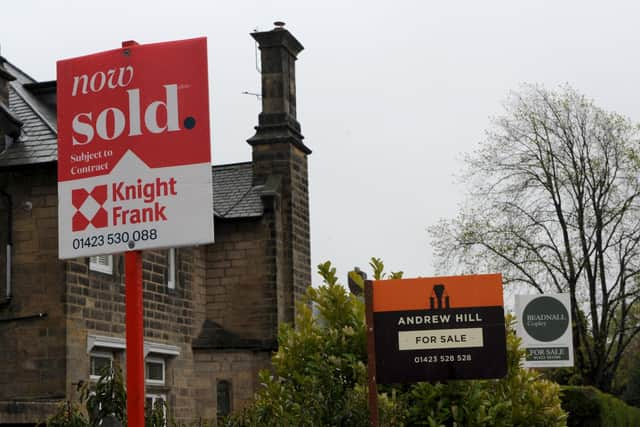Why were the rates of stamp duty on house purchases lowered? - Andrew Brown
Yet amongst all the chaos that followed the recent un-costed budget there is one decision that stands out as particularly peculiar. Why were the rates of stamp duty on house purchases lowered?
To those trying to buy their first home this might sound like a strange question. Any help a government can give to reduce the daunting cost of getting on the housing ladder must look very welcome.
Advertisement
Hide AdAdvertisement
Hide AdThere is, however, one slight problem. If the government makes it a little easier for one person to buy a house by cutting tax on the purchase price, then it also makes it easier for another.


Other things being equal, all that happens is the price of the house you are hoping to buy gets bid up by the same amount as the tax cut because potential purchasers can all afford to pay that little bit more.
The words “other things being equal” are doing a lot of heavy lifting here.
Because when the government cuts taxes without explaining where the money comes from there is usually a strong reaction from the markets. Which is exactly what happened this time.
Advertisement
Hide AdAdvertisement
Hide AdTax giveaways that aren’t funded have a nasty tendency to cause the pound to drop in value making imports more expensive and also push up the rate of interest that investors want in return for lending money to the UK government.
Curiously not too many people want to buy the debt of an unstable government that is paying out a rate of interest around 5 per cent in a country with inflation running at 10 per cent.
That has had the knock-on effect of mortgage companies pulling out of lending money to people who thought were moving smoothly towards borrowing and buying. It is also why we have seen the Bank of England resort to printing money to buy government debt when what it actually thought was needed was to stop printing money to restore faith in the currency and weaken inflation.
Serious increases in the rate of interest have as a consequence hit the very first-time buyers that the Chancellor and the Prime Minister were hoping to help. There is no guarantee that the trend of rising rates will stop any time soon.
Advertisement
Hide AdAdvertisement
Hide AdThe only genuinely good piece of news for potential new home buyers in all of this is that rapidly rising interest rates normally push down the price of houses and make the size of the debt needed to buy them a little smaller.
For once a drop in stamp duty might actually be accompanied by falling house prices.
The first major piece of bad news is that new purchasers now face the worry of the home they have just borrowed money to buy going down in value so that they end up owing more than the value of their new home.
The other rather large piece of bad news is that servicing any debt that is taken on will be massively harder.
Advertisement
Hide AdAdvertisement
Hide AdBoth for an individual home buyer and for the government. Also, for businesses. There is almost nothing about higher interest rates that benefits the economy with the few gainers mainly being those who are trying to live off the interest on savings which are crashing in value by 10 per cent a year.
Those who are trying to buy a home are likely to find themselves trapped by intimidating mortgage costs, high energy bills and the daily struggle to afford food that is rising in price by 11 per cent a year.
This makes first time house purchase virtually impossible for those who don’t have access to significant financial support from family members.
One of the things virtually all political parties agree on is that they want as many people as possible to make progress in life through their own efforts. That has just become a lot harder.
Advertisement
Hide AdAdvertisement
Hide AdFew of us want to live in a world like the one that Jane Austin described where what mattered was not your own talent and hard work but your expectations of inheritance and the wealth of your family.
It is fantastic that so many political leaders are committed to trying to help more people own their own home.
It is rather less fantastic that we have a government that wastes money on a cut in taxation that achieves nothing and makes home purchase harder as a result.
If there was money to spare it might have been better to use it to provide some good quality council housing at affordable rents.
Advertisement
Hide AdAdvertisement
Hide AdIf there wasn’t then it was all the more foolish to waste scarce resources on destabilising the finances of the nation. And of everyone trying to pay off a mortgage.
Andrew Brown is a Craven District councillor representing Aire Valley with Lothersdale and the North Yorkshire councillor for Aire Valley. He was the Green Party Parliamentary Candidate for Skipton and Ripon in 2015, 2017 and 2019.